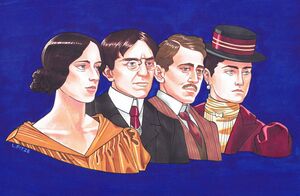Orthodox Republicanism: Difference between revisions
(Added details, added a date where necessary.) |
(Deleted empty sections for the time being) |
||
| Line 13: | Line 13: | ||
==History== | ==History== | ||
==Theory== | ==Theory== | ||
Revision as of 05:08, 30 December 2024
This article is incomplete because it is pending further input from participants, or it is a work-in-progress by one author. Please comment on this article's talk page to share your input, comments and questions. Note: To contribute to this article, you may need to seek help from the author(s) of this page. |

| Part of a series on |
| Orthodox Republicanism |
|---|
 |
Orthodox Republicanism (Viswe: Prawosławny Republikanizm; Hetumogye: Ortodox Republikanizmus; Prykordonnyan: православний республіканізм) is a political, philosophical and economic ideology within the broader New Republican movement, characterized by the creation of an Orthodox Republic, a government system that is dedicated towards the advancement of the goals of individuals that regards social reform as its primary tool of social advancement. An Orthodox Republic primarily focuses on the promotion of human rights and social justice, while economically is considered to be centre-left. In its original form, it was considered to be closer to economic socialism. Since 1910 however, it has since trended towards a form of democratic capitalism that still has some elements of socialism that trend towards catering towards improvements in quality of life for the individual. Ideologically, it's governing structure is similar to that of a liberal democracy. It is the governing ideology of the New Republican Coalition and the Orthodox Republic of Vistulzka
Orthodox Republicanism was first formulated in 1909 by then university student Aldona Szczepański and political theory professor Krzysztof Baczyński during the Second Political Odrodzenie. Historians categorize this stage of early Orthodox Republicanism to be an evolutionary branch of Common Good Government. Orthodox Republicanism as it was defined by Baczyński worked off the basis of political ideas promogulated during the First Political Odrodzenie that emphasized social freedom and libery, as well as ideas of secularism and the abolition of nobility within the country. This was precipitated by the Coronation of Casimir VI in the same year and the re-establishment of the Second Vistulzkan Empire. Baczyński would invite political theorists Béla Edvárd and Yulia Tymoshenko, involving them with the formal development of Orthodox Republicanism. The group is titled by historians as the Ortho Vanguards, as part of the larger political faction known as the New Era Republicans. The four collaborated and published the Testament of the States in 1912, the seminal work that served as the political and ideological basis for Orthodox Republicanism. It was defined by the ideas of social progress, nationalism, anti-colonialism, and autonomous labor management with a government operating under the principles of a democratic republic which served with the intention of acting as a public steward. The ideology rejected many of the social ideas that were considered to part of the right-wing, including in ideologies such as Combinationalism despite drawing parallels on government operation.
Orthodox Republicanism was further developed and expanded upon with the publication of Humanity and Individualism, which was primarily written by Szczepański. It pushed the ideology closer to the right economically. Szczepański sought to distance Orthodox Republicanism from socialism and Delarueism. She believed that there was more common ground to be established with other right-leaning ideologies such as Combinationalism, at least on an economic level. Humanity and Individualism sought to define the boundaries of where the individual and its individual rights must be guaranteed and protected by the state, and which point where the state must intervene. Szczepański greatly distanced the ideology from any form of anarchism, but showed particular distain towards anarcho-capitalism. She promoted the idea that the central state and its power was pivotal to preventing any form of a Redivergence, otherwise defined as a return to undemocratic principles or the collapse of societal order.
Orthodox Republicanism approached its modern form with the publication of Manifesto of the New Republican Movement in 1926, which was primarily written by Edvárd with contributions from the other New Era Vanguards. It also contained additional contributions and essays from other important Orthodox Republicans, including Bartholomew Kovalenko, Fidél Égető, Krzysztof Gogacz, Natalia Herashchenko, and Piroska Rickl. Orthodox Republicanism became the dominant ideology with Edvárdism being the most influential school of thought.
Following the Vistulzkan Civil War, Orthodox Republicanism began to branch out as many of the original founding members wrote independent manuscripts and manifestos as to the definition of Orthodox Republicanism, often conflicting with each other. Aldonism, Edvárdism, Baczyńskism, and Tymoshenkoism were the characterizations of the different ideological views based on their independent manuscripts. The most predominant of these ideologies was Edvárdism, where many of his ideals were adopted by the Orthodox Republican Party during the Civil War. Kovalenkoism was the developments of Orthodox Republicanism under the 1st President of Vistulzka Bartholomew Kovalenko. Root Orthodoxy is the basis of Orthodox Republicanism that strictly describes the formulation of the ideology as it was in Testament of the States.
History
Theory
Edvárdism
Edvárdism is the political theory that originates from Béla Edvárd and his works, and are considered to the pinnacle of contemporary progressive politics and was the most influential school of thought within Orthodox Republicanis. Edvárd often focused and championed on individual rights as well as economic freedom.
Aldonism
Aldonism is the political theory that originates from Aldona Szczepański and her works, and is considered to be consequentialist interpretation of Orthodox Republicanism that was more focused on the economic aspects. She abandoned certain principles that are retained in other branches of Orthodox Republicanism. The most poignant idea that Szczepański promoted was Szczepański's Paradox, that in a free society, a democratic republic is inevitably and it will eventually gravitate towards a full centralized state or towards a form of anarcho-capitalism. Free society has and will always be in a free fall cycle between democracy, centralization and full destabilization.